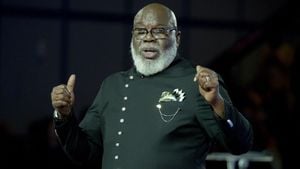Donald Trump's recent return to the political stage has stirred up the conversation among voters, scholars, and pundits alike. Running for his second term as President of the United States has not only reignited old debates but also introduced new inquiries about the possible ramifications of his proposed power expansions. Supporters and critics are keeping a close eye on how his re-election campaign might reshape the principles of governance.
The discourse surrounding Trump’s candidacy raises concerns over the balance of power among the branches of government. One of the primary points of contention is his proposal to utilize recess appointments. This method would allow him to appoint individuals to key governmental roles without the input of the Senate, thereby bypassing typical checks and balances. Critics argue this could enable Trump to establish what they term “an imperial presidency,” similar to the power structures found in more authoritarian regimes.
Trump's proposed maneuvering isn’t new; it taps deeply-rooted frustrations with Congress's long-standing trend of ceding its authority to the executive branch. Over decades, various administrations have increasingly relied on executive actions to implement their agendas, affirming the president's dominant position. Some analysts point to this shift as part of the United States’ gradual departure from its founding principles. The Constitution intended for Congressional powers to be preeminent, recognizing the legislative branch as the one closest to the people. If Trump's plan takes shape, it could dramatically alter this relationship.
Further complicity arrives through proposed revival practices known as 'impoundment.' Traditionally, this would permit the president to refuse allocating funds appropriated by Congress, which raises concerns of government accountability. Such actions would not just undermine legislative control over budgeting but could potentially dismantle the framework of accountability entrenched within American democracy. The failure of previous checks, like the Impoundment Control Act of 1974, serves as cautionary tales against such executive overreach.
While campaigning, Trump has positioned himself as the protector of traditional values, appealing directly to the emotions of his base. But beneath this veneer lies the question: at what cost might these impulses lead? The true implications of his second term could dismantle collective governance, pushing the country closer to the brink of authoritarian tendencies if unchecked.
Meanwhile, reaction from other political figures, including those from the Democratic side, adds additional layers to the narrative. Leaders like Vice President Kamala Harris have expressed clear opposition to Trump's bid, framing it not solely as political rivalry but as existential risks to democratic integrity. Harris's recent concession after the elections may have unsettled some, but it highlights the fierce competitiveness prevailing among political factions.
Adding complexity to these discussions is the new composition of Trump's cabinet, which is already reflecting his prior administration's controversial stances. Individuals like Pam Bondi have made headlines, particularly after her involvement with high-profile issues such as the release of Epstein’s client list. Her appointment raises eyebrows about how vigorously Trump intends to pursue investigations against his opponents and the ethics surrounding his appointments.
The court of public opinion continues to pass judgment, with mixed reactions to Trump's perceived demeanor. Footage of lighthearted exchanges, including one where he interacts with young admirers, paints him as ‘America's grandpa’ to some, yet incites harsh criticism from his detractors who reshape moments to fit narratives of controversy. The challenge remains for Trump to maintain appeal across demographics starkly divided on his tactics and persona.
While Trump's strategy appears orchestrated to maximize his support base, it conversely risks alienation. Some moderates express unease over how aggressively he might pursue consolidative power if elected. The latent potential for repeated clashes between the executive and legislative branches looms large, particularly if Trump's plans for appointments proceed without opposition.
This second bid for the presidency is seen not merely as another campaign but as pivotal for discussions on American governance itself. Many are pondering: what might happen if Trump achieves significant legislative changes? The prospect of unchecked presidential authority entices serious fears of autocracy among commentators and laypersons alike. Beyond just policies and agendas, Trump's presidency symbolizes broader democratic principles at stake.
Whether one supports Trump or rebukes him, it becomes undeniable; the upcoming election will serve as much more than just choosing between candidates. It provides citizens the chance to weigh their foundational beliefs against the backdrop of changing political power dynamics. The structures of American democracy are rooted deeply, yet they remain vulnerable to shifts if neither voters nor politicians stand vigilant against encroachments.
Trump’s political aspirations aren't occurring within isolation; they manifest amid America’s persistent struggles with identity and governance, forcing the populace to confront uncomfortable truths about their democracy. Each bold movement he makes during the campaign carries repercussions destined to affect the dynamics of American politics well beyond just the next election.
So, as the political climate thickens, the clock ticks down to what is set to be one of the most contentious presidential races seen yet. What will Trump's legacy be if he regains the presidency? Nervous speculation among proponents and opponents alike amplifies urgency—this isn’t just politics, it’s the very nature of democracy itself at stake.
Unquestionably, if Trump returns to power, the ramifications for governance and the delicate balance among America’s branches will challenge lawmakers and citizens to reassess what it means to coexist under constitutional constraints. How society reconciles these ambitions—his and others—will determine the next chapter of the American democratic narrative.



